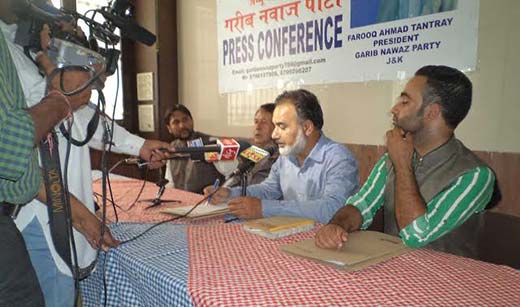Mushrooming of small political parties in election season is an expected crop. But what is perhaps not expected is the fall of their allegiance once counting would begin in mid-December. Bilal Handoo reports the trend of floating electrons being wooed by BJP for its Mission 44+
A lesser known Garib Nawaz political party while briefing Press in Jammu this summer vowed to “eliminate” the dynasty rule of Jammu and Kashmir. The party president Farooq Ahmad Tantray said such rule has been “misusing” the emotions of the people since 1947.
With this Abdullah bashing, this ‘party of paupers’ signalled its emergence on state political arena. But in the run up to polls on 87-member state assembly, many small parties have mushroomed on the scene.
Recently the bureaucrat-turned-politician Farooq Renzu floated a new party Kashmir Development Front (KDF) along with Fazal Rehman Beig (brother of PDP’s Muzaffar Beig). After failing to get Congress mandate, Renzu ‘in protest’ floated his own party. (Renzu had joined Congress earlier this year within weeks after his retirement.) Similarly, after failing to secure PDP ticket for a Baramulla seat, Fazal shook hands with Renzu in their poll venture. Now, the Renzu-Fazal get-together is planning to contest 6 to 10 seats on “development” plank—which interestingly fits with the BJP’s state agenda.
Already six small parties have sprouted on the scene in this election season. Another name in this kitty is the doctor-engineer ‘camaraderie’ party. Floated by a medico Mohammad Ashraf Bhat and an engineer Masood Hussain, J&K Tehreek-i-Haq (Movement for Truth) is advocating: “poll-boycott was illegal”—because the duo believes people have a right to vote for the formation in a democratic government. The party’s general secretary (a doctor of music and former PDP worker) Shazad Asim was denied PDP’s Sopore ticket, forcing him to jump into a new ‘political enterprise’.
Adding up to the list of new political crop is an NGO-turned-political party, Peoples Republic Party. Set up by one Dr Farooq Dar in south Kashmir recently, the party has given poll tickets to panchayat members.
In the spring of 2014, when parliamentary polls were round the corner, many small parties sprang on scene. One among the many was the party floated by a PM Scholarship controversy linked Rabia Baji. Her Awami Ittehad Front eventually lost polls, but that didn’t stop press attention on her. Having a Congress background, Rabia was running an academic consultancy before jumping into poll fray early this year.
Other than Baji, there is one lawyer-turned-politician Fayaz Bhat who floated his J&K Peoples United Front followed by Kashmiri’s Liberal Democratic Party by Bashir Ahmad Malik and Jammu Kashmir Awami Tehreek by former PDP worker Syed Reyaz Khawar.
“These small parties are mix of individual ambitions and state craft,” believes political science professor, Gull Wani. “But they aren’t serious contenders. In fact, they won’t last long post-polls. But yes, eventually they would end up securing protection, accommodation and vehicle.”
It is mainly argued that number of contestants goes up when state conditions turn hostile. That happened during 2008 land row—and probably, the trend is remerging in the deluge-hit state.
In 2008 assembly elections, total 45 political parties were in fray—majority of them were new entrants who evaporated from the scene post-poll, including Al India Forward Bloc, Revolutionary Socialist Party, Ambedkar National Congres, Adarsh Politcal Party, Backward Clases Democratic Party, Samta Party, United Citzen Party and others.
But unlike 2008, the upcoming polls seem crucial exercise after BJP (virtually absent from the valley’s political circle) is reportedly attempting to hook up small players to make inroads in valley’s political arena.
BJP aspires to provide ‘good governance’ by ending poverty and backwardness in J&K, asserts Ram Madhav, BJP general secretary and party’s state in-charge. “With this objective,” he continues, “BJP is meeting and trying to bring to the forefront people who would also be opposed to the National Conference and the People’s Democratic Party.” In fact, Shazad Asim of Tehreek-i-Haq admits being approached by the BJP.
Echoing Madhav’s views, one BJP leader believes “fissures” in Congress-NC alliance has motivated BJP to throw its weight behind smaller contesting groups in valley. “The purpose is to inch closer to Mission 44+,” he quips.
But for regional players like NC and PDP, the newly-floated parties are spoilers “with a design”. “These parties are proxies with a design,” believes PDP spokesman Naeem Akhtar. “Their only politics is to cut and fragment valley votes. Such parties evaporate post-polls.”
“Such parties are floated by certain power centre to have leverage,” says NC spokesman Junaid Azim Mattu, “but we are not threatened because electorally they mean nothing.” Mushrooming of small parties is post-1996 trend, says Mattu: “These parties vanish post-polls.”
Perhaps Mattu is missing the point: these smaller parties helped spike voting percentage in otherwise pro-boycott constituencies in past, like in Sopore.
But Engineer Rashid who is also reportedly on BJP’s poll radar believes if people have conviction they should float parties. Rashid who started his Awami Ittehad Party earlier this year, says: “The NC and the PDP have no monopoly on Kashmir politics. If any party thinks these smaller parties are proxies then whose proxy is PDP’s Mufti?”
Perhaps by speaking his heart out, Rashid has cleared some smokescreen behind the mushrooming trend of small players in poll season. The trend has indeed set off.
















